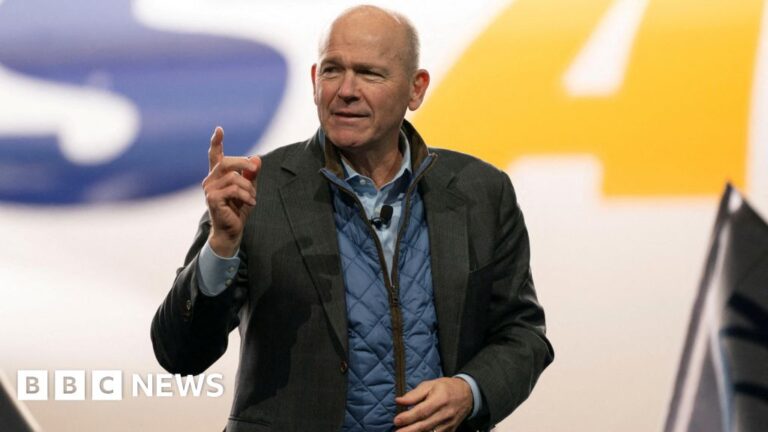- author, Charlotte Edwards
- role, BBC Business Correspondent
Boeing CEO Dave Calhoun He is expected to tell U.S. lawmakers on Tuesday that he understands concerns about the airline’s safety culture after an air emergency in January raised alarms.
“Our culture is far from perfect, but we are taking action and we are moving forward. We understand the seriousness of this matter,” he said in prepared remarks ahead of a Senate subcommittee hearing.
Alaska Airlines has been in the spotlight after an unused door fell off one of its new 737 MAX planes during a flight, ripping a large hole in the side of the plane.
As part of the ongoing investigation, a Boeing whistleblower told the Senate in April that the 737 Max, 787 Dreamliner and 777 models had serious manufacturing problems.
But concerns about Boeing’s attitude toward safety and quality control conditions at its factories are not new.
The company faced intense criticism five years ago after losing two 737 MAX planes in separate but nearly identical crashes that killed 346 people.
Calhoun is also due to apologize to affected families on Tuesday, marking the first time he will testify before the committee during his term as chief executive.
“I am deeply sorry for your sacrifices,” he began. “Nothing is more important than the safety of those who fly on our planes.”
He became Boeing’s chief executive officer in 2020 as the company was struggling with the aftermath of a deadly crash.
The Boeing 737 Max was temporarily grounded following the Lion Air crash in October 2018.
The plane crashed into the Java Sea 13 minutes after taking off from Jakarta, Indonesia, killing all 189 people on board.
In March 2019, an Ethiopian Airlines Boeing 737 MAX plane crashed six minutes after taking off from Ethiopia’s capital, Addis Ababa.
All 157 people on board were killed, and both crashes were caused by malfunctions in the flight control systems.
Since the incidents in 2018 and 2019, the victims’ families have spoken out, some of whom are still working to resolve legal claims against the company.
Several people are scheduled to appear at Tuesday’s hearing.
One of them is Zipporah Kuria, who lost her father in the 2019 crash.
“I flew from the UK to Washington DC to hear firsthand what Boeing’s CEO would tell the Senate and the world about the safety improvements his company has made,” she said in a statement ahead of the hearing.
“We will not rest until justice is achieved,” she added.
Ahead of Tuesday’s hearing, Sen. Richard Blumenthal, the committee’s chairman, said in a statement that “Boeing must repair its broken safety culture. That is the task ahead for management.”
“Years of putting profits over safety, stock price over quality and production speed over responsibility have led Boeing to this moment of reckoning. The company’s empty promises no longer work,” he added.
Dave Calhoun, Boeing’s outgoing CEO and president for the past four years, also said in a prepared statement that he was “grateful” that no one was killed in the Alaska Airlines crash.
“I come from this industry and I know all too well that in this industry you always have to do it right,” he wrote.
He added that in the wake of the incident the company was cooperating with U.S. authorities in their investigation, listening to employees and imposing “stand-by” measures at factories to address potential issues.
The company also submitted a plan to regulators in May aimed at improving the quality of its aircraft.

